

Kyle
Student teacher
Geography Home Page - Geography at About.com. The Age of Global Warming, Rupert Darwall. Global Warming Is Harming Our Food Supply. When people consider the effects of global warming, the first thing they think about is the weather.

The moderate among us complain (rightly or wrongly) about that they'll have to pay higher air conditioning bills in the summer, while the more apocalyptic think up Roland Emmerich-like scenarios where extreme tsunamis wash away New York City. IEA Urges Policy Action on Global Warming, Worries U.S. Shift to Natural Gas May Slow. By Rick Mitchell PARIS--Without new environmental or other regulations to tighten carbon dioxide emissions standards for existing coal-fired power plants, the recent U.S. shift to cleaner running gas-fired plants could begin to fizzle out because of rising gas prices, according to an International Energy Agency report released June 10.

The World Energy Outlook Special Report, Redrawing the Climate-Energy Map offers the U.S. case as an example of areas in which it says urgent, but feasible, policy actions are needed to get the world off its current path toward global warming that is highly likely to produce a big increase in catastrophic climate events. The report recommends four energy policies it says countries could implement immediately using existing technology, without harming economic growth and without waiting for a global climate agreement to take effect in 2020. However, rising gas prices are calling that shift into question, it said. Uncharted Territory. National Geographic - Inspiring People to Care About the Planet Since 1888. Social Sciences Online - eZSSOL. Social Sciences and Public Policy: qualifications, research and careers. The Association of Social Science Researchers. Humanities & Social Sciences « Panels & Committees « Our Organisation.
History. Those who cannot remember the past are condemned to repeat it.[1] History (from Greek ἱστορία, historia, meaning "inquiry, knowledge acquired by investigation")[2] is the study of the past, particularly how it relates to humans.[3][4] It is an umbrella term that relates to past events as well as the memory, discovery, collection, organization, presentation, and interpretation of information about these events.

Scholars who write about history are called historians. Events occurring prior to written record are considered prehistory. Economic history. Development as a separate field[edit] Treating economic history as a discrete academic discipline has been a contentious issue for many years.
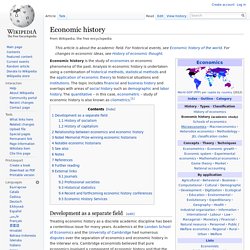
Academics at the London School of Economics and the University of Cambridge had numerous disputes over the separation of economics and economic history in the interwar era. Cambridge economists believed that pure economics involved a component of economic history and that the two were inseparably entangled. International Economic History Association - Home. History of capitalism. Max Weber's model of capitalist development.
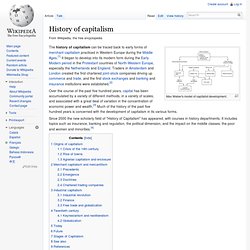
The history of capitalism can be traced back to early forms of merchant capitalism practiced in Western Europe during the Middle Ages.[1] It began to develop into its modern form during the Early Modern period in the Protestant countries of North-Western Europe, especially the Netherlands and England. Traders in Amsterdam and London created the first chartered joint-stock companies driving up commerce and trade, and the first stock exchanges and banking and insurance institutions were established.[2] Philosophy. Philosophy is the study of general and fundamental problems, such as those connected with reality, existence, knowledge, values, reason, mind, and language.[1][2] Philosophy is distinguished from other ways of addressing such problems by its critical, generally systematic approach and its reliance on rational argument.[3] In more casual speech, by extension, "philosophy" can refer to "the most basic beliefs, concepts, and attitudes of an individual or group".[4] The word "philosophy" comes from the Ancient Greek φιλοσοφία (philosophia), which literally means "love of wisdom".[5][6][7] The introduction of the terms "philosopher" and "philosophy" has been ascribed to the Greek thinker Pythagoras.[8] Areas of inquiry Philosophy is divided into many sub-fields.

Free will. Incompatibilism. Incompatiblists agree that determinism leaves no room for free will.
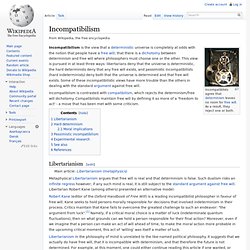
As a result, they reject one or both. Dilemma of determinism. The dilemma of determinism or standard argument against free will is an argument that there exists a dilemma between determinism and its negation, indeterminism, in that both are purported to undermine the possibility of free will.
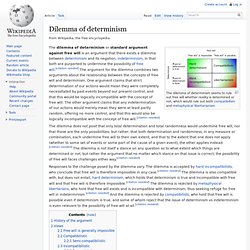
[citation needed] The argument for the dilemma combines two arguments about the relationship between the concepts of free will and determinism. One argument claims that strict determination of our actions would mean they were completely necessitated by past events beyond our present control, and that this would be logically incompatible with the concept of free will. The other argument claims that any indetermination of our actions would merely mean they were at least partly random, offering no more control, and that this would also be logically incompatible with the concept of free will.
[citation needed] Compatibilism. Compatibilism (or soft determinism) is the belief that free will and determinism are compatible ideas, and that it is possible to believe both without being logically inconsistent.[1] Compatibilists believe freedom can be present or absent in situations for reasons that have nothing to do with metaphysics.
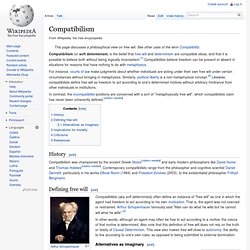
For instance, courts of law make judgments about whether individuals are acting under their own free will under certain circumstances without bringing in metaphysics. Similarly, political liberty is a non-metaphysical concept.[2] Likewise, compatibilists define free will as freedom to act according to one's determined motives without arbitrary hindrance from other individuals or institutions. In contrast, the incompatibilist positions are concerned with a sort of "metaphysically free will", which compatibilists claim has never been coherently defined. Determinism. Determinism is the philosophical position that for every event, including human action, there exist conditions that could cause no other event.

"There are many determinisms, depending upon what pre-conditions are considered to be determinative of an event. "[1] Deterministic theories throughout the history of philosophy have sprung from diverse and sometimes overlapping motives and considerations. Determinism.